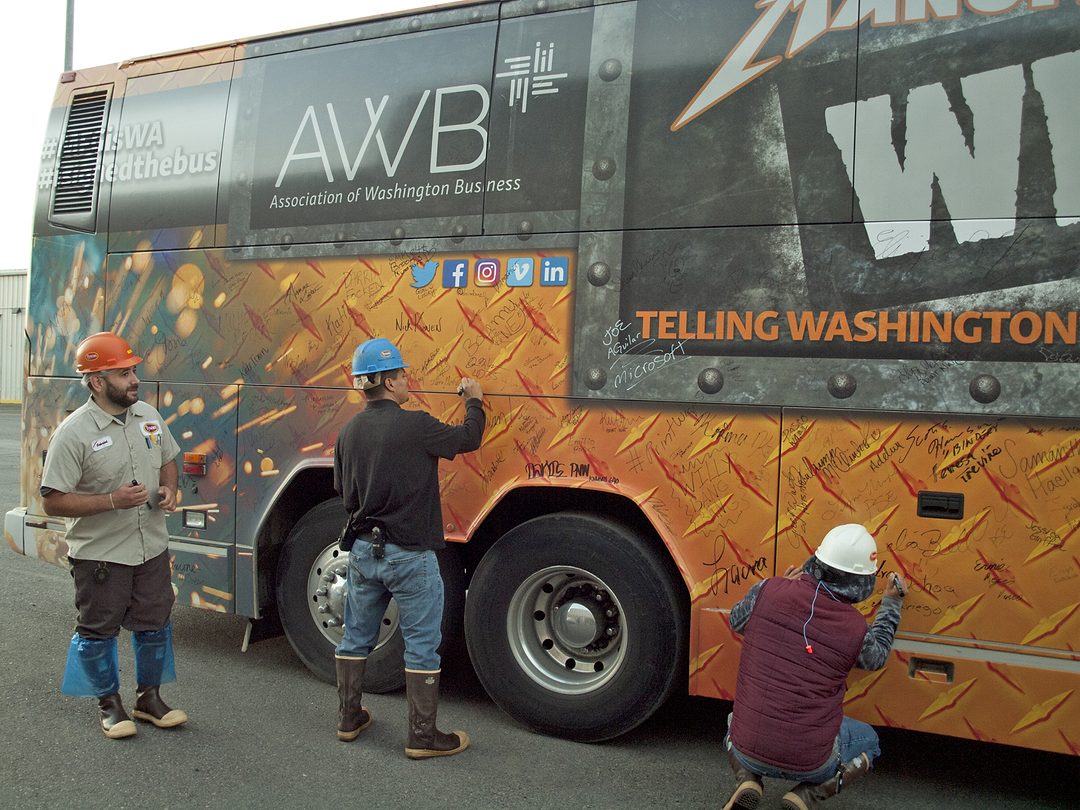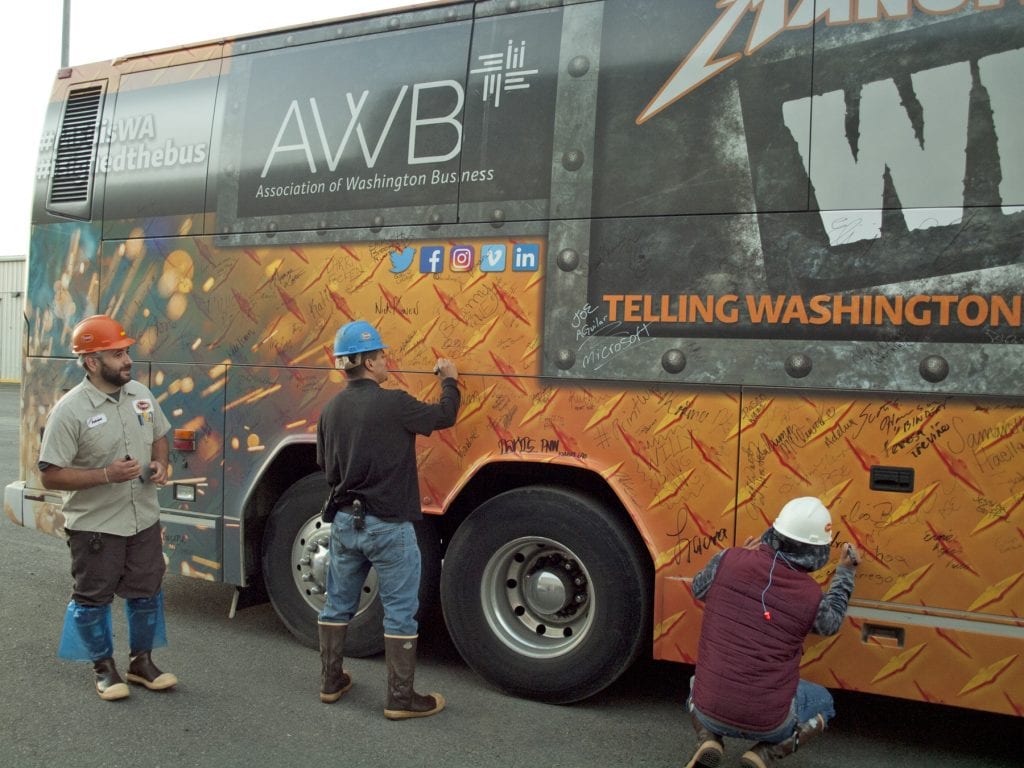
Home » Tyson announces $36M expansion during statewide manufacturing tour
Tyson announces $36M expansion during statewide manufacturing tour

November 14, 2018
As an Association of Washington Business bus rolled into the parking lot of Tyson Fresh Meats bright and early on a recent morning in Wallula, many of the cattle slaughterhouse and beef processing plant’s 1,400 workers were arriving for work.
Even more people will be joining them at their job site next year when a $36 million addition is completed at their Walla Walla County plant at 13983 Dodd Road, just east of Burbank. The project will add 32,000 square feet to the ground floor and 16,000 square feet to the upper level and require the hiring of 45 or more workers to staff a new production line.
The growing Tyson plant was one stop on AWB’s seven-day 1,500-mile cross-state tour of 45 Washington manufacturers to generate support for the industry.
“Manufacturing is vital to Washington’s economy and provides a proven pathway to the middle class,” said AWB President Kris Johnson.
Washington state boasts 7,326 manufacturing firms that account for 12.4 percent of the state’s total economic output, representing more than $58 billion per year, according to Gov. Jay Inslee’s proclamation designating October as Careers in Manufacturing Month.
Tyson’s expansion is doing its part, as it will support a new contract with the maker of the “fresh never frozen patty,” who wishes to remain unnamed. It is one of the largest contracts that Tyson’s Wallula plant has ever agreed to, said Brad Anderson, operation manager III.
The facility will be responsible for providing products to all the customer’s West Coast locations, including Hawaii and Canada.
Tyson is planning to begin distribution from the new plant by June 1.
The lower level of the expansion will house a new, state-of-the-art hamburger patty production line and the upper level will provide additional office space. It will mirror the company’s Amarillo, Texas, plant.
Apollo Mechanical Contractors of Kennewick is the general contractor.
Meier Architecture and Engineering of Kennewick is handling civil and electrical design.
The Wallula facility is one of six similar plants Tyson operates across the U.S., this one serving the West Coast and the company’s Asian export markets.
Jorge Guzman, an operations manager at Tyson, said 38 percent of the facility’s primarily Northwest-sourced products are exported, with 10 percent going back to the Midwest and eastern U.S. and the remainder distributed throughout the West Coast region.

The Wallula plant originally opened in 1966 as a family-owned operation before being bought by Columbia Foods in 1971, then by IBP in 1976. Tyson acquired the plant in 2001.
The AWB team spent a day in the Tri-City area and also visited Douglas Fruits in Pasco, Tri-Tech Skills Center in Kennewick, Washington State University Wine Science Center in Richland and Chukar Cherries in Prosser.
Highlighting the industry is important because manufacturing jobs continue to decline across the state, according to AWB. There’s been a 21.5 percent decline in employment within the sector during the past 20 years.
The peak for manufacturing jobs in Washington was 20 years ago with 363,700 jobs and those numbers have been declining ever since.
In June 2018, the state recorded 287,700 manufacturing jobs, but this still falls short of the post-recession peak of 292,800 in 2015. Manufacturing job totals were last above 300,000 in December 2000, despite the addition of about 1.4 million residents to the state since then, the AWB said.
This is an issue for the most export-dependent state in the nation, but especially for its rural economies, Johnson said.
“There is a strong, robust manufacturing sector in the Tri-Cities economy and community,” Johnson said. “We make a lot of things that a lot of people don’t necessarily make the connection or don’t necessarily realize are made in Washington state.”
He added, “I think not many people wake up and realize that 8,500 men and women wake up every day and go to manufacturing jobs (in the Tri-Cities).”
According to Tyson officials, some 90 percent of its workers live in the Tri-Cities, with the remaining commuting from Walla Walla, Hermiston, Benton City and Sunnyside.
Johnson said the manufacturing sector offers good family wage jobs that provide entry-level workers a clear career pathway, enabling employees to own homes and live in the communities in which they work.
The industry has provided a successful career for David Tobias, human resources manager at Tyson’s Wallula plant. He’s worked there for 35 years. He started out on the production floor, rising through the ranks as he put himself through night school to eventually head the human resources department for the facility.
Though a statewide shrinking work force continues to be a hurdle for manufacturers, Johnson said he and his team observed many of the companies they visited on this year’s tour offer facility tours, internship programs and more to inspire the workers of tomorrow.
The Wallula plants runs a program called Tyson University, which operates in cooperation with Walla Walla Community College since 2001, Tobias said.
Workers can earn their high school equivalency certificate and take courses to improve their English and computer literacy skills. The program is facilitated by two full-time instructors from the college who are on site daily.
Tobias said the company hopes to continue to expand these programs and provide more opportunities in the future.
Before the AWB bus rolled out of Wallula, officials encouraged Tyson employees to add their signatures to the bus’s custom wrap as an act of solidarity with other manufacturing workers across the state.
Washingtonians working in manufacturing earn $5.1 million in wages, according to the governor’s office.
Local News
KEYWORDS november 2018





